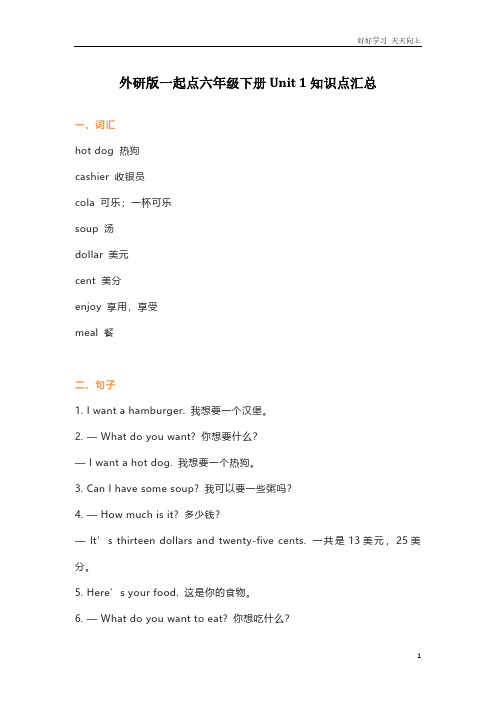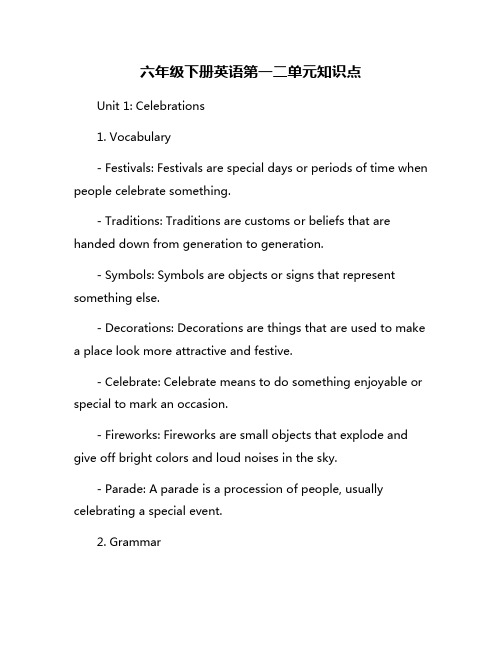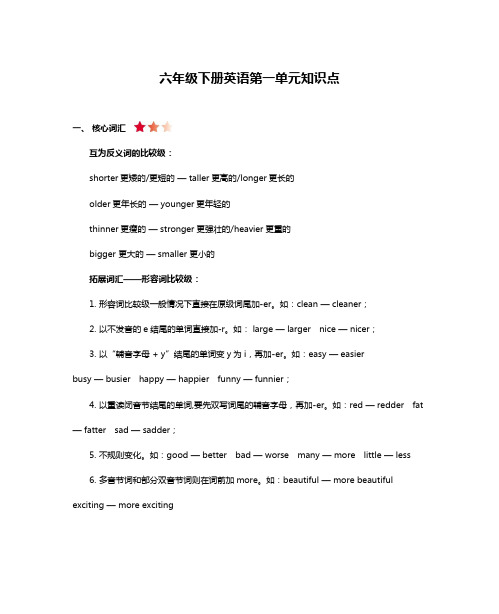六年级英语下册第一单元知识点
小学六年级下册英语第一单元必背词语及短语

小学六年级下册英语第一单元必背词汇及短语一、语音a—/ei/: cake, lake, datee—/i:/: these, evening, Chinesei—/ai/: kite, like, rideo—/au/: those , home, noseu—/ju:/: use, student, music,二、词汇形容词:famous著名的fat胖的thin瘦的动词:travel旅行made make的过去式show绐……看其他:along沿着anywhere任何地方三、短语winter activity冬季活动in winter在冬天winter vacation寒假climb a mountain爬山the Yangtze River长江 a long river一条长河take photos照相cold and windy寒冷多风go skating去滑冰on the lake 在湖上go back回到Ice and Snow Festival冰雪节a big ice city一座大冰城have fun玩得开心in the snow在雪里make a snowman堆雪人take a photo of.给……拍一张照片a lovely snowman一个可爱的雪人look at. 看……the Spring Festival春节Chinese New Year中国的新年in January在一月play with. 和……玩New Year’s money压岁钱have a good time 玩得开心四、常用表达式①Hi! 嗨!②How about you? 你呢?③Look. 看。
英语六年级下册第一单元知识点

英语六年级下册第一单元知识点English: In the first unit of the sixth-grade English textbook, students typically learn about various topics such as introducing oneself, talking about hobbies, describing family members, discussing daily routines, and expressing likes and dislikes. They are introduced to new vocabulary related to these themes, along with grammar points such as present simple tense, possessive adjectives, basic prepositions of place and time, and question forms. Reading passages and dialogues are provided to reinforce comprehension skills, and students are encouraged to engage in speaking activities to practice their oral communication. Additionally, they may learn about cultural aspects related to English-speaking countries, fostering a broader understanding of the language and its context. Throughout the unit, students engage in activities that promote listening, speaking, reading, and writing skills, aiming for comprehensive language acquisition.中文翻译: 在六年级英语教科书的第一单元中,学生通常会学习各种主题,如自我介绍,谈论爱好,描述家庭成员,讨论日常作息,以及表达喜好和不喜欢。
PEP英语六年级下册 Unit 1单元知识梳理

新版PEP六年级英语下册Unit 1知识点归纳一、必背词汇tall ------ taller 高的----更高的dinosaur 恐龙short ------ shorter 矮的/短的----更矮的/更短的hall 大厅long ------ longer 长的----更长的than 比strong------ stronger 强壮的----更强壮的both 两个都old ------ older 老的/旧的----更老的/更旧的meter 米形容词young------ younger 年轻的----更年轻的kilogram千克;公斤adj. small------ small 小的----更小的others size 号码thin ------ thinner 瘦的----更瘦的feet 脚heavy------heavier 重点----更重的wear 穿low------ lower 低地----更低地countryside乡村smart------smarter 聪明的----更聪明的shadow 影子;阴影become变成;开始变得辅+元+辅--------双写最后一个辅音字母+er辅音字母+y -----改y为i +erbig-----bigger 大的-----更大的happy-----happier 开心的-----更开心的thin-----thinner 瘦的-----更瘦的heavy-----heavier 重的------更重的fat-----fatter 胖的------更胖的funny-----funnier 滑稽的------更滑稽的二、重点句型⑴问年龄,身高,体重等How old are you? How tall are you? How heavy are you?---- I’m _______ (years old). ---- I’m ______metres tall. ---- I’m ______ kilograms .⑵问物品的情况:① How large is your room? 你的房间有多大?It’s __________ m2 (square meters.) 有_______ 平方米。
外研版一起点六年级下册Unit 1知识点汇总

外研版一起点六年级下册Unit 1知识点汇总一、词汇hot dog 热狗cashier 收银员cola 可乐;一杯可乐soup 汤dollar 美元cent 美分enjoy 享用,享受meal 餐二、句子1. I want a hamburger. 我想要一个汉堡。
2. — What do you want? 你想要什么?— I want a hot dog. 我想要一个热狗。
3. Can I have some soup? 我可以要一些粥吗?4. — How much is it? 多少钱?— It’s thirteen dollars and twenty-five cents. 一共是13美元,25美分。
5. Here’s your food. 这是你的食物。
6. — What do you want to eat? 你想吃什么?— I want to eat some meat. 我想吃些肉。
7. Can I help you? 我可以帮你吗?8. — What do you want to drink? 你想喝什么?— Milk, please. 请来一杯牛奶。
三、句型结构1. I want + a/ an/ some... + 名词. 表示某人想要某物。
eg: I want some eggs. 我想要一些鸡蛋。
2. What do you want to eat/ drink? 询问对方想吃/ 喝什么。
eg: — What do you want to drink? 你想喝点什么?— A cup of coffee, please. 请来一杯咖啡。
3. — How much is ...? 询问某物多少钱。
— It’s ...eg: — How much is the coat? 这个外套多少钱?— It’s one hundred yuan. 一百元。
六年级下册英语第一二单元知识点

六年级下册英语第一二单元知识点Unit 1: Celebrations1. Vocabulary- Festivals: Festivals are special days or periods of time when people celebrate something.- Traditions: Traditions are customs or beliefs that are handed down from generation to generation.- Symbols: Symbols are objects or signs that represent something else.- Decorations: Decorations are things that are used to make a place look more attractive and festive.- Celebrate: Celebrate means to do something enjoyable or special to mark an occasion.- Fireworks: Fireworks are small objects that explode and give off bright colors and loud noises in the sky.- Parade: A parade is a procession of people, usually celebrating a special event.2. Grammar- Present simple tense: We use the present simple tense to talk about general truths, habits, and routines.- Adverbs of frequency: Adverbs of frequency tell us how often something happens. Some examples are always, usually, often, sometimes, and never.3. Reading and Writing- Reading comprehension: Reading comprehension is the ability to understand and interpret a text.- Writing a diary entry: A diary entry is a personal record of daily events and experiences.Unit 2: Nature1. Vocabulary- Habitat: A habitat is the natural environment where an animal, plant, or organism lives.- Endangered: If a species is endangered, it is at risk of becoming extinct.- Eco-friendly: Eco-friendly means not harmful to the environment.- Pollution: Pollution is the presence of harmful substances in the environment.- Extinct: Extinct means that a species no longer exists.- Conservation: Conservation is the protection and preservation of natural resources.2. Grammar- Modal verbs: Modal verbs are auxiliary verbs that express possibility, necessity, ability, permission, or obligation.- Comparatives and superlatives: Comparatives are used to compare two things, while superlatives are used to compare three or more things.3. Reading and Writing- Descriptive writing: Descriptive writing describes a person, place, or thing in detail.- Writing a persuasive text: Persuasive writing aims to convince the reader of a certain point of view or a call to action.In summary, the first two units of the sixth-grade English textbook cover vocabulary related to celebrations and nature, as well as grammar points such as the present simple tense, adverbs of frequency, modal verbs, and comparatives andsuperlatives. Students also practice reading comprehension, writing diary entries, descriptive writing, and persuasive texts.。
人教版六年级下册英语第一单元知识点

六年级下册英语第一单元知识点一、核心词汇互为反义词的比较级:shorter更矮的/更短的— taller更高的/longer更长的older更年长的— younger更年轻的thinner更瘦的— stronger更强壮的/heavier更重的bigger 更大的— smaller 更小的拓展词汇——形容词比较级:1. 形容词比较级一般情况下直接在原级词尾加-er。
如:clean — cleaner;2. 以不发音的e结尾的单词直接加-r。
如: large — larger nice — nicer;3. 以“辅音字母 + y”结尾的单词变y为i,再加-er。
如:easy — easierbusy — busier happy — happier funny — funnier;4. 以重读闭音节结尾的单词,要先双写词尾的辅音字母,再加-er。
如:red — redder fat — fatter sad — sadder;5. 不规则变化。
如:good — better bad — worse many — more little — less6. 多音节词和部分双音节词则在词前加more。
如:beautiful — more beautiful exciting — more exciting二、了解词汇dinosaur恐龙hall大厅 metre米(美式英语: meter) than比 both两个都kilogram千克;公斤countryside乡村lower(low的比较级)更低地shadow阴影;影子 smarter(smart的比较级)更聪明的 become开始变得;变成三、核心句型1. — How tall are you? 你有多高?— I'm 1.64 metres. 我身高1.64米。
2. — What size are your shoes, Mike? 迈克,你穿多大号的鞋?— Size 7. 7号。
(完整版)人教版六年级下册英语知识点总结
六年级下册英语知识点总结第一单元(Unit1 How tall are you?)句子:1、That's the tallest dinosaur in this hall.2、You're older than me.3、How tall are you ?你有多高?4、What size are your shoes ?5、My shoes are size 37.6 、Your feet are bigger than mine .7、How heavy are you ?你有多重?8、It's taller than both of us together .应该掌握的知识点:1、形容词变为比较级的变化规则:(1) 一般情况下,在形容词的词尾直接加那是这个厅里最高的恐龙。
你比我大。
I' m 1.65 metres我身高1.65 米。
你穿多大号的鞋?我穿37 号的鞋。
你的脚比我的大。
I' m 48 kilograms .我体重48公斤。
它比我们俩加在一起还高。
er。
女口: tall —taller short—shorter.⑵以字母e结尾的形容词,在词尾直接加r,如:nice—nicer. late— later(3) 以重读闭音节结尾,且结尾只有一个辅音字母的词,先双写这个辅音字母,再力口er.如: big—bigger thin—thinner fat—fatter(4) 以辅音字母加y 结尾的双音节形容词,先变y 为i , 再加er。
如:easy—easier heavy—heavier funny—funnier.2、部分形容词比较级的不规则变化:good/well—better3、 比较级的标志:tha n 。
弓I 导比较级的特殊疑问词: Which 。
句子结构为:Which+名词+is+形容词比较级。
比较级+and+比较级表示:越来越 ...4、 A 与 B 比较的句子结构: A+be 动词+形容词比较级 +than+B. 否定句句子结 构:A+be 动词+not+形容词比较级+than+B. —般疑问句句子结构:Be 动词+A + 形容词比较级 +than+B ?A 比B 多多少的句子结构:A+be 动词+数字+单位+形容词比较级+than+B 。
六年级下册英语书电子版译林版课堂笔记第一单元
译林版小学英语六年级下册第一单元知识点【Story time部分】课文详细解读1.in the forest在森林里rge and strong大而强壮的3.walk by走过,路过4.wake清醒,醒来–woke(动词过去式)wake up醒来动词+副词结构,注意把宾语放在动词后,wake sb.up使某人醒来5.some day某一天(用于说话时刻之后的将来某一天)6.small and weak又小又弱ugh loudly大声地笑8.let go让…走9.the next day第二天10.catch抓住-caught(动词过去式)catch the lion with a large net用一张大网抓住了狮子with此处表示方式,用…的工具,是介词而非动词with a large net用一张大网11.bit the net with his sharp teeth用他的尖牙咬这张网bite咬-bit(动词过去式)with his sharp teeth用他的尖牙12.help帮助help sb.(to)do sth.帮助某人做某事help sb.with sth.在某方面帮助某人词组举例:help me learn English=help me with my English在英语学习方面帮助我13.get out出去14.just then就在那时15.make制作-made(动词过去式)make a big hole in the net with his teeth用他的牙在网上咬了一个大洞16.from then on从那时起(过去时间标志)17.become friends变成朋友become成为,变成became(动词过去式)【Story time课文语段语法精讲】1.There was a lion in the forest.森林里有一只狮子。
该句为“There be…”句型在一般过去式中的用法was是is的过去式;后面加的名词为复数时,则需使用There were…句式。
人教PEP版英语六年级下册Unit 1-4知识点总结(期末复习)
Unit1How tall are you?一、核心词汇互为反义词的比较级:shorter更矮的/更短的—taller更高的/longer更长的older更年长的—younger更年轻的thinner更瘦的—stronger更强壮的/heavier更重的bigger更大的—smaller更小的拓展词汇——形容词比较级:1.形容词比较级一般情况下直接在原级词尾加-er。
如:clean—cleaner;2.以不发音的e结尾的单词直接加-r。
如:large—larger nice—nicer;3.以“辅音字母+y”结尾的单词变y为i,再加-er。
如:easy—easier busy—busier happy—happier funny—funnier;4.以重读闭音节结尾的单词,要先双写词尾的辅音字母,再加-er。
如:red—redder fat—fatter sad—sadder;5.不规则变化。
如:good—better bad—worse many—more little —less6.多音节词和部分双音节词则在词前加more。
如:beautiful—more beautiful exciting—more exciting二、了解词汇dinosaur恐龙hall大厅metre米(美式英语:meter)than比both两个都kilogram千克;公斤countryside乡村lower(low的比较级)更低地shadow阴影;影子smarter(smart的比较级)更聪明的become开始变得;变成三、核心句型1.—How tall are you?你有多高?—I’m1.64metres.我身高1.64米。
2.—What size are your shoes,Mike?迈克,你穿多大号的鞋?—Size7.7号。
3.—How heavy are you?你体重多少?—I’m48kilograms.我体重48公斤。
六年级下册英语知识素材 Unit 1 The lion and the mouse知识点及练习 译林
Unit1The lion and the mouse【教学目标】1.能够掌握loudly,sadly等副词的用法2.能够用英语有条理地使用一般过去时讲述童话故事3掌握large,walk by,wake…up,some day,from the n on的用法4.能够学会“第二天“的英文表达5.掌握help…up用法6.特殊疑问句的语调降调【教学重点】副词在句子中的基本用法;重点四会单词的用法【教学难点】副词的使用【教学过程】一、复习本单元重点单词及其用法1.mouse老鼠n.注意:复数mice发音:ou/au/mouse,house,shout,out,about,mouth,playground/ʌ/country,touch,cousin,y oung/u/should,could,would练习:() A.y oung B.mouse C.h ou se D.out 例:想要吃了老鼠want to eat the mouse让老鼠走let the mouse go抓住老鼠catch the mouse” ”盒子里有一只老鼠。
There is a mouse in the box.狮子有没有吃了老鼠?Did the lion eat the mouse?2. large 大的 adj.反义词:small近义词:big发音:ar /a:/ large, car , farm, card, arm, park, far , star/ ɔ:/warm, quarter练习:( ) A. park B. g ar de n C. warm D .large例:一个大城市 a large city用一张大网抓住狮子 catch the lion with a large net3. strong 强大的,强壮的 adj.例:一头又大又强壮的狮子 a large and strong lion强风 strong wind这头狮子非常强壮。
- 1、下载文档前请自行甄别文档内容的完整性,平台不提供额外的编辑、内容补充、找答案等附加服务。
- 2、"仅部分预览"的文档,不可在线预览部分如存在完整性等问题,可反馈申请退款(可完整预览的文档不适用该条件!)。
- 3、如文档侵犯您的权益,请联系客服反馈,我们会尽快为您处理(人工客服工作时间:9:00-18:30)。
narrow
cleverer
narrower
cleverest
narrowest
其他双音节词和多音节词,在前面加more, most来构成比较级和最高级。
原级
比较级
最高级
beautiful
interesting
important(重要的)
more beautiful
more interesting
theirs他(她,它)们的
用法
用来做主语,通常放在句子的最前面.Iam a student .
用来做宾语,常放在句子最后面You’re shorter thanhim.
必须跟名词连用My penis blue .
单独使用,不用跟名词.因为它本身包含前面提到的名词.常放在句子最后.This is your ruler .That ismine.
六年级英语下册单元知识点
第一单元
形容词的比较等级
大多数形容词有比较级等级的变化,即原级、比较级和最高级,用来表示事物的等级差别,原级即形容词的原形,比较级和最高级有规则变化和不规则变化两种。
1.规则变化
单音节词和少数双音节词,加词尾-er, -est来构成较级和最高级。
构成法
原级
比较级
最高级
一般单音节词末尾加-er, -est
tall
great
taller
greater
tallest
greatest
以不发音的e结尾的单音节词和少数以-le结尾的双音节词只加-r, -st
nice
large
able
nicer
larger
abler
nicest
largest
ablest
以一个辅音字母结尾的闭音节单音节词,双写结尾的辅音字母,再加-er, -est
big
thin
hot
bigger
thinner
hotter
biggest
thinnest
hottest
“辅音字母+y”结尾的双音节词,改y为i,再加-er, -est
early
easy
earlier
easier
earliest
easiest
少数以-er, -ow结尾的双音节词末尾加-er, -est
You(你,你们)
you(你,你们)
your(你,你们)的
yours(你,你们)的
He(他)
him(他)
his(他)的
his(他)的
She她
her她
her她的
hers她的
It它
it它
its它的
its它的
We我们
us我们
our我们的
ours我们的
They他(她,它)们
them他(她,它)们
their他(她,它)们的
more important
mostbeautiful
most interesting
most important
2.不规则变化
原级
比较级
最高级
good(好的)well(健康的)
better
best
bad(坏的)ill(有病的)
பைடு நூலகம்worse
worst
old
older (elder)
oldest (eldest)
many much(多的)
more
most
little(少的)
less
least
far(远的)
farther (further)
farthest(furthest)
人称的主格、宾格,形容词性物主代词和名词性物主代词
主格
宾格
形容词性物主代词
名词性物主代词
单词
I (我)
me (我)
my(我)的
mine(我)的
(mine=my ruler .)
